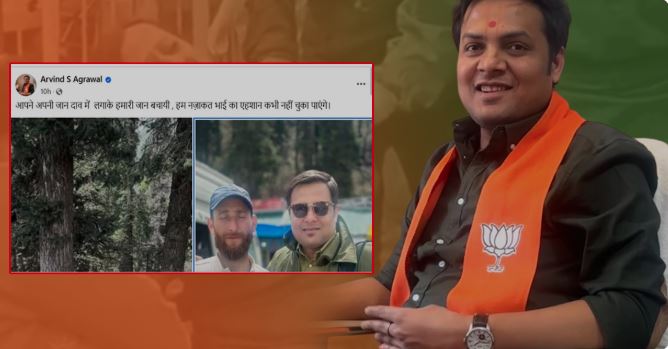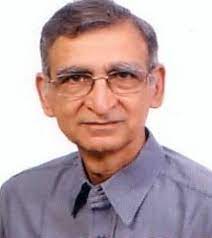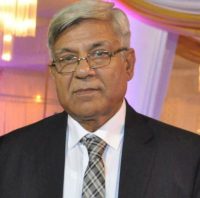The recent tragedy in Pahalgam has left me deeply saddened. My thoughts and prayers are with the bereaved families, and I strongly condemn the heinous act, without any reservations.
Yet, every time such a terrorist incident occurs, a pattern emerges that demands reflection: why does the collective Indian Muslim voice suddenly become anxious, compelled to condemn the actions of an individual or group merely because the perpetrators happen to share their religion or names associated with Islam ? Why must their condemnation be not only vocal but also visible so that it is heard in both public discourse and the corridors of power ?

The service of Majid, Aadil and Nazakat won the hearts of the Hindus of India. But the hateful Chintus did not stop working as laborers to continuously spread hysteria, terror and communalism in the country.Pic
At the very outset, we must ask: why should the Indian Muslim community as a whole feel obligated to make public declarations every time an act of terrorism takes place ?
Our laws do not hold an entire family accountable for the crime of one member; likewise, an entire community should not be burdened with guilt or suspicion simply due to shared faith or ethnicity.
Unfortunately, there exists a widespread presumption often unspoken yet deeply ingrained that terrorism is synonymous with Islam or Muslims.
This is not to ignore facts. It is true that investigations have found some individuals from the Muslim community involved in terrorism, and conviction rates might reflect that.
But it’s equally important to note that many innocent Muslims have also been falsely implicated and convicted, only to be exonerated later. Despite the complex reality, the larger question remains: why must every Indian Muslim come forward, again and again, to publicly denounce acts they had no connection with?
Empathy and sorrow are natural human emotions in any civilized society. We all grieve the loss of innocent lives, especially in senseless violence.
We feel greater sorrow for those closest to us, or when the deaths are caused by catastrophes, accidents, or murder. But perhaps the most painful are killings without any personal motive—such as terrorism.
Like any other member of Indian civil society, Muslims are just as pained and shocked by acts of violence. So why is there an additional burden placed on them to constantly prove their loyalty, to loudly declare their condemnation, as if silence would be interpreted as complicity ?
Let’s take a historical lens: during the 1970s and 1980s, Punjab was in the grip of militancy. Terrorism claimed hundreds of lives, yet no one expected every Sikh citizen to take to the streets to apologize or publicly distance themselves from the acts of extremists.
No one demanded that they stand on platforms and assert their allegiance to India. So why is the standard different for Muslims?
Terrorism, by its very nature, is abhorrent. No normal, compassionate person supports it, regardless of religious background.
I do not know who committed the Pahalgam attack, but I believe that whoever takes innocent lives is not worthy of being called human.
The law must take its course. However, we must also question the increasing tendency of “media trials,” which jump to conclusions even before the investigations conclude, painting entire communities with a broad brush of suspicion.
Democracy in India is undergoing a crisis. Peaceful protests, symbolic gestures like wearing black badges, or expressing solidarity with international causes like Palestine are now seen as provocative acts especially when Muslims do them.
If Indian Muslims are not allowed to protest systemic injustices or police excesses, then how can they be expected to take responsibility for the acts of a few?
Today, if Muslim organizations voice genuine concerns or criticize political leadership, they risk arrests. On the other hand, when fringe leaders openly insult political figures with foul language, often targeting the Prime Minister or Chief Ministers by name, they walk free. The double standards are hard to miss.
My dear Muslim friends, you will exhaust yourselves trying to prove your nationalism and solidarity. Those you’re trying to convince are not interested in acknowledging your efforts.
They practice “tajahul-e-arifana” – pretending ignorance even when they know the truth. These are the same people who dismiss the legacies of Mahatma Gandhi and Pandit Nehru, ignore the wisdom of Maulana Azad, and question the patriotism of film legends like Dilip Kumar, Shah Rukh Khan, or Aamir Khan with the sole exception of A.P.J. Kalam.
I recall a personal incident from 1993. I was invited to the residence of Mr. Tribhuvan Prasad Tewari, former Lieutenant Governor of Puducherry and a renowned civil servant in Uttar Pradesh, known in power circles as “TPT.”
After our official conversation, I asked him for his advice to Indian Muslims. His reply was simple and profound: “Hubbul Watani se kaam len”- Let patriotism guide you.
When I asked him to elaborate, he said, Talk about the Himalayas, Ganga and Yamuna, like poets Rahim, Raskhan, or the then-popular Bekal Utsahi, known for “Geet” in his Urdu poetry.
A few months later, I read in The Times of India that TPT had been appointed the UP chief of the RSS. Interestingly, Prime Minister Narendra Modi, in a television interview, once said: “I don’t wear a cap because I follow my religion and respect others.”
I agree with his sentiment, Indian Muslims too should follow this path: stay rooted in their faith while respecting all others.
Chief Minister Yogi Adityanath, in another interview, mentioned that while he wouldn’t go to a mosque as a Sanatan Hindu, he would go there as the Chief Minister if duty called.
This is the kind of secular professionalism that India needs more of where personal belief does not interfere with public responsibility.
In conclusion, Indian Muslims should not feel pressured to repeatedly prove their patriotism or disown acts committed by unrelated individuals. Condemning terrorism is natural, but being forced to do so, again and again, speaks to an unfair societal expectation.
 Times Of Pedia Times of Pedia TOP News | Breaking news | Hot News | | Latest News | Current Affairs
Times Of Pedia Times of Pedia TOP News | Breaking news | Hot News | | Latest News | Current Affairs




